- Home
- Patricia MacLachlan
Fly Away
Fly Away Read online
For Sofia, who first sang the song—
For Nicky, who sings it too.
Love,
P. M.
My thanks to Anne Ramsey, Director of the Dalcroze School at the Lucy Moses School in New York City, who adapted “The Birdies Fly Away” song from Engelbert Humperdinck and graciously gave me permission to use it. My thanks also to Haeeun Shin, talented Eurhythmics teacher at the Concord Conservatory of Music in Concord, Massachusetts, who taught the song to my grandchildren, Sofia and Nicholas.
—Patricia MacLachlan
The Birdies Fly Away
The birdies fly away, and they come back home.
The birdies fly away, and they come back home.
Fly away, fly away
All the birdies fly away,
The birdies fly away, and they come back home.
chapter 1
Secrets
We drive across the Minnesota prairie in our old tan and green Volkswagen bus. My father does not believe in new cars. He loves the old Volkswagen with the top that pops up like a tent. He can take the motor apart and fix it himself.
In the way back are neat wooden framed beds for sleeping. In a pen are Mama’s chickens: Ella, Sofia, and Nickel. Mama loves them and never goes away for long without them. My younger sister, Grace, sits in her car seat next to me. In back of her is Teddy, the youngest, with his stuffed beaver.
My father, called Boots because he wears them, is driving, listening to opera on the radio. It is La Traviata.
Misterioso, misterioso altero . . .
I know it well. If a conductor dropped dead on stage I could climb up there and conduct.
Now here is something abnormal. I can’t sing. When I open my mouth nothing happens. I know the music, but I can’t sing it. I can only conduct it.
My father went to Harvard. His parents expected him to be a banker like his father. In secret he planned to be a poet.
But then he discovered cows. He became a farmer.
He loves cows.
“They are poetry, Lucy,” he tells me. “I can’t write anything better than a cow.”
Maggie, my mother in the front seat, wears headphones. I know she is listening to Langhorne Slim. She loves Langhorne Slim as much as my father loves opera. And I know her secret. She would like to sing like Langhorne Slim. She would like to be Langhorne Slim.
If you’ve got worries, then you’re like me.
Don’t worry now, I won’t hurt you.
My younger sister, Gracie, ignores the opera and my mother’s bopping around in the front seat. Gracie sings in a high perfect voice, fluttering her hands like birds.
“The birdies fly away, and they come back home.
The birdies fly away, and they come back home.”
I turn and look at my little brother, Teddy. He smiles at me and I know what that smile is all about.
In his small head he is singing the “Fly Away” chorus in private so no one can hear.
Fly away, fly away,
All the birdies fly away.
I smile back at him.
This is our secret because Teddy wants it that way.
I have known for a long time that Teddy can sing perfectly in tune even though he is not yet two. We all know he doesn’t speak words yet. But only Teddy and I know that he sings. He doesn’t sing the words, but sings every song with “la la la.” He sings to me every night, climbing out of his bed, padding into my room in the dark. He sings a peppy “Baa, Baa, Black Sheep,” ending with a “Yay” at the end with his hands in the air.
“La La La La
LaLaLaLaLa.
Yay!”
He sings a soft, quiet “All the Pretty Horses.” “La, la, la.”
I made a mistake once and told them all—Boots, Mama, and Gracie—that Teddy can sing. They didn’t believe me. And of course Teddy wouldn’t sing for them. Only for me.
“I’ve never heard Teddy sing,” says Gracie.
“He can’t even talk yet,” says Mama. “How could he sing?”
Teddy has music but no words.
I have words but no music.
We are a strange pair.
And here is my secret: I am planning to be a poet. I have written thirty-one and a half poems. Some are bad. They are bad hideaway poems. I plan to get better and publish better poems and buy Mama more chickens and take Boots to see La Traviata at the opera house in New York City, wherever New York City is.
When I get to be a poet Boots will be pleased.
He will be proud.
And one day, for him, I will write a poem as beautiful as a cow.
chapter 2
Cow
The reason we have all been loaded into the old bus is that we spend part of every summer with Aunt Frankie in North Dakota. Everyone calls her Frankie. Her name is Francesca, but she says that is pretentious. That is the first time I ever heard the word “pretentious,” and I’ve been looking for a time to use it ever since. It is much too long for a poem.
Frankie, who Mama says is as “old as time,” lives far out in the middle of the universe. She lives by a big river that floods in the rainy season. It is now the rainy season, and Boots says it will flood while we’re there.
“Frankie will need our help even though she doesn’t think so,” says Boots.
“She is so stubborn,” my mother complains.
Boots looks at me in the rearview mirror. It is like looking into my eyes, we look so much the same.
He smiles.
“Who else is stubborn?” he asks.
“Mama!” says Gracie.
Frankie has a few milking cows she milks every day, but leases most of the higher meadowland for other people’s cattle.
There are few trees, no mountains, just miles and miles of prairie grass and gophers and sky.
And the river.
Frankie’s house is the house where Mama grew up. Mama loved it and hated it at the same time. She always cries when we get there and cries when we leave. Maybe one day I’ll understand that.
“It sounds like ‘the birdies fly away and come back home’ to me,” I once said to Boots.
“You’re very right,” he said, peering at me as if I’d said something important.
At dusk we find a place to stop for the night. It is a state park hill with an open field, bordered by a farmland fence. Mama lets Sofia, Ella, and Nickel out of their crates and spreads chicken feed on the ground for them. They flap their wings and mosey around, eating and strutting. My mother and father get out their chairs and their small stove. They set up their tent near a tree. Gracie, Teddy, and I always sleep in the car beds, Teddy in the middle. Mama and Boots could sleep in the bus, but they love their small domed tent.
“Why can’t we stay in a motel?” Gracie asks. “Trini’s family goes to a motel with a pool and dining room and miniature golf course where a little volcano goes off if you get a hole in one.”
I know what Boots is about to say. I’ve heard it many times. I’ve even written a poem about it. Gracie has heard it before too, but she is young enough to think the answer may change when she asks to stay in a motel. She’ll know better one day.
Motel Room
Where’s the river?
Where’s the sky?
Can’t see the clouds—
Or bluebirds fly by.
Boots waves his arm.
“In a motel you wouldn’t have this great view,” says Boots. “You’d have four walls with boring paintings.”
“Maybe a motel would have a pool,” said Gracie.
“Maybe we’ll find a river,” said Boots.
Can’t smell the flowers,
Can’t smell the sea—
Four walls and bad art
Is all that you’ll see.
I take
Teddy for a walk in the meadow. He reaches up and takes my hand with his tiny hand. His hand is warm. He wears red sneakers and a faded T-shirt with a green fish on it.
Suddenly Teddy stops. He is staring at something. He points.
“Cow,” he says.
“Teddy, you said cow!”
As far as I know Teddy has never said cow. But he says it as clear as light. He says it again.
“Cow.”
“Mama!” I shout. “Boots! Teddy said cow!”
Mama waves. Boots and Gracie come quickly across the field and look where Teddy is pointing. Far off, at the fence, stands a cow. It is a kind of cow I’ve never seen. Ever.
“Oh, my.” Boots’s voice is strange. “Oh, my,” he repeats.
“Cow,” says Teddy again.
“Oh, my,” says Boots again.
I feel like I’m in a strange echo chamber.
Boots starts to walk toward the fence, then comes back to scoop Teddy up in his arms. He beckons for us to follow.
At the fence is a very large cow. She is beautiful and black, with a wide white stripe around the middle of her. My breath catches. Maybe Boots is right after all. That he couldn’t write anything more beautiful than a cow. Maybe no one can.
“Cow,” says Teddy.
“I know that,” I say, then I laugh because it is Teddy I’m answering.
“Dutch Belted,” says Gracie. “Boots’s cows are mostly Holsteins or Guernseys,” she tells me.
Gracie has a chart at home of all the cow breeds. She opens her notebook and takes out a pen. She begins to draw the cow.
“I’ve never seen one,” says Boots. He puts his hand across the fence and the cow moves back quickly. Then, after a moment, she comes back so Boots can rub her head.
“Beautiful,” says Boots. “Beautiful Dutch Belted.”
“Cow,” says Teddy.
“Yes, Teddy,” says Boots. “Dutch Belted.”
Teddy reaches his hand over the fence and rubs the cow’s head, imitating Boots. The cow’s tongue comes out, long and rough, making Teddy jump.
The sun goes down behind the faraway line of trees. Two more Dutch Belted cows move toward us, probably hoping for grain.
“Cow,” whispers Teddy, putting his arm around Boots’s neck.
Nighttime. Grace is sleeping. She is always first to go to sleep. There are stars out in the black sky and I can see the glow of the lantern light in Mama and Boots’s tent. There is a slice of moon above the trees.
“See?”
It is Teddy’s little voice next to me. That’s the only part of my name, Lucy, that he can say—the “see” of Lucy.
“Teddy,” I whisper.
“Cow,” he says.
“Cow,” I whisper.
His eyes gleam in the dark. I know he’s going to sing now. And he does. He sings the song perfectly, all the la la’s in tune. I hear the words in my head.
“Fly away, fly away,
All the birdies fly away.”
I reach over and take his hand.
And we sleep.
chapter 3
Night Song
In the morning it is drizzly and dreary. Boots is listening to the weather forecast on the car radio.
“More rain and storms today,” he says, worried.
Mama packs up the chickens. I help Gracie into her car seat. She clicks herself in. I lift Teddy into his seat back by the chickens. I click him in.
He points to the chickens.
“Cow,” he says.
Gracie and I laugh.
“Chickens,” says Gracie. “I’ll draw you one.”
She takes out her paper and markers and quickly draws a very good chicken. She hands it to Teddy.
Teddy smiles at her.
“Cow,” he says happily.
“I think that for Teddy ‘cow’ means ‘Look! There’s something!’ ” I tell Gracie.
Boots stows the tent in the storage under the beds. The car is packed.
Boots starts up the car.
“Ready?”`
“Ready,” says Mama. She puts on her headphones.
“A day and a half to go,” says Boots.
Boots turns on his tape. Today it is Aida, the triumphal march. Somewhere in act 2. Boots once told me that when the opera is presented there is a huge parade of people and animals, sometimes elephants, camels, and horses. Maybe I’ll take Boots to see Aida when I’m a rich poet. There aren’t any elephants or camels in La Traviata.
We drive off in the mist. Gracie leans over and points to Teddy. He is keeping time to the music on his car seat. If he hears it enough, he’ll be able to sing it.
We drive off down the highway. I take out my writing book and my pen. I stare at the blank lined page. I feel the same way about a blank page that my Mama feels about her old home in North Dakota. I love it because it is fresh and clean. I hate it because I have to fill it.
I think about the shining coal-black cow with the surprising white circle around her middle.
I write a line.
Ring-Around cow.
I look at it so hard my eyes blur.
Outside the car window horses run by the fences.
“Cows!” yells Teddy.
“I have to go to the bathroom!” calls Gracie.
I sigh.
It’s going to be a long drive.
It is late afternoon when the storm starts, rain coming down softly at first, then harder. There is thunder and lightning, the lightning coming down to the land all around us. The wind picks up.
Teddy sleeps through the storm in his car seat, a sweet peaceful look on his face. Flashes of lightning light up his face, but still he sleeps.
Then there is a new sound.
Mama takes off her headphones to listen. Hail begins to fall on the roof of the van, bouncing off like small stones at first, then harder, so hard that Boots can’t hear his music. Boots pulls off the road, peering through the windshield. He parks under an overhang by gas pumps. The sudden quiet wakes Teddy.
“See?”
“It’s all right, Teddy. You can go back to sleep.”
Teddy puts his thumb in his mouth and closes his eyes.
“I’ll fill the gas tank and then we’ll decide what to do. We can’t drive in this.”
Mama peers out.
“No, we can’t. It isn’t safe.”
Boots pumps gas and runs into the gas station. I can see him talking on the cell phone. After a bit he comes back with crackers and cheese, some bottles of cold water, and cookies.
His hair is wet with rain.
“I called Frankie and told her we’d be there for her,” he says. “She said stay away. She doesn’t need help.”
“Of course she did,” says Mama. “Frankie is stubborn.”
Boots smiles.
“She told me to turn around and go home!” he says.
“What did you say?” I ask him.
“I told her okay, we’d go home,” says Boots.
“You didn’t tell the truth,” says Gracie.
“True. I didn’t want Frankie to worry.”
“That woman,” says Mama.
Boots takes her hand.
“That woman,” he whispers, making Mama smile.
“All the motels are full,” Boots says, handing out snacks.
“We can’t set up our tent in this,” says Mama.
Boots shakes his head.
“The owner of the gas station says there’s a park with a pavilion down the road. We can park under it for the night.”
“And food?” asks Mama.
“We’ll get hamburgers just before we get there.”
“Where will you sleep?” asks Gracie, yawning already.
Boots drives off, the noise sudden and loud again.
“We’ll all sleep in the car!” says Boots with a laugh. “It will be fun!”
Mama laughs too.
“Even the chickens?” asks Gracie.
“Even the chickens,” say Mama and Boo
ts together, laughing.
My parents are crazy.
We eat hamburgers and Teddy discovers pickles.
“Mo,” he says. “Mo.”
So we hand our pickles over to him.
We park under the pavilion and put down the front car seats.
The hail is still strong on the pavilion roof, but when Mama and Boots get in their sleeping bags, the chickens between them, it is fun.
And when Boots turns out the lantern and it is dark, Teddy leans over close to me.
“See?”
“Teddy.”
And he sings to me. He sings “Twinkle, Twinkle” without words, and “Fly Away,” the whole song.
But the noise of the hail is so loud that no one else hears.
I’m glad.
I like that this is our secret, Teddy’s night song.
Teddy’s and mine.
chapter 4
Red River
The next day there is light mist and sun at the same time. We drive with a huge rainbow off in the horizon.
“Rainbow, Teddy,” says Gracie. “See?”
“Cow,” say Teddy and Gracie and Mama and Boots at the same time, knowing what he will say.
Teddy thinks it is very funny that we all say the same thing, so he says it again.
“Cow!”
“I wish he’d say more words,” says Mama. “He’s a late talker. You all spoke early.”
“Early and often,” says Boots.
“He talks in his own way,” I say.
Mama turns to look at me.
If only Mama knew.
“We all have things we can do and can’t do,” says Boots.
“Well, I can’t sing,” I say, hoping for comforting words from Mama.
“I know,” says Mama.
Boots looks quickly at Mama.
“Maggie? That sounds a little unkind.”
A little.
“Oh,” says Mama. “I didn’t mean that.”
Boots looks in the rearview mirror until he finds me.
I know him well enough to know what he is thinking.
It is this: It’s all right if you can’t sing.
All morning long we pass fields and rivers that are filled to their banks with water. We pass herds of cows and horses. We pass pigs and goats and farm meadows filled with sheep. It seems that Teddy has tired of calling everything he sees “cow.” I turn to him as we pass the sheep.

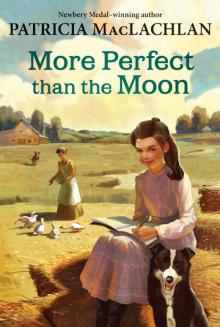 More Perfect Than the Moon
More Perfect Than the Moon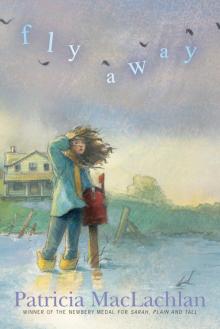 Fly Away
Fly Away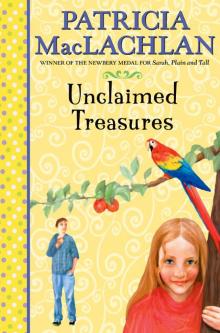 Unclaimed Treasures
Unclaimed Treasures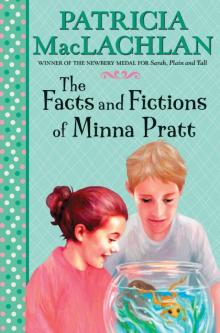 The Facts and Fictions of Minna Pratt
The Facts and Fictions of Minna Pratt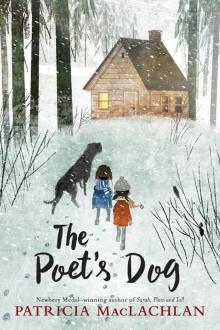 The Poet's Dog
The Poet's Dog Journey
Journey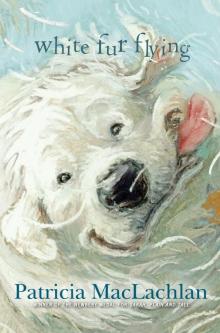 White Fur Flying
White Fur Flying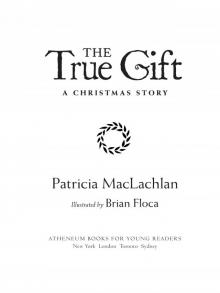 The True Gift: A Christmas Story
The True Gift: A Christmas Story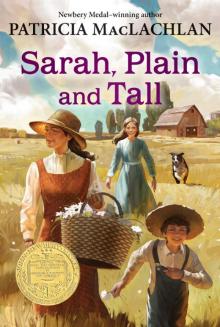 Sarah, Plain and Tall
Sarah, Plain and Tall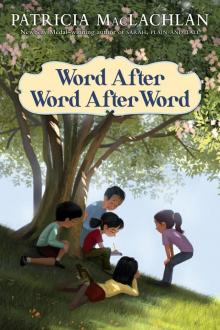 Word After Word After Word
Word After Word After Word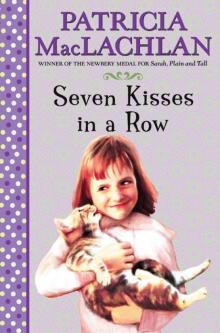 Seven Kisses in a Row
Seven Kisses in a Row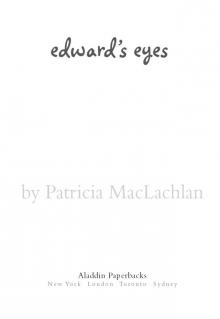 Edward's Eyes
Edward's Eyes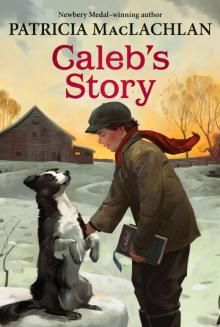 Caleb's Story
Caleb's Story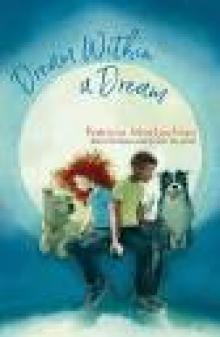 Dream Within a Dream
Dream Within a Dream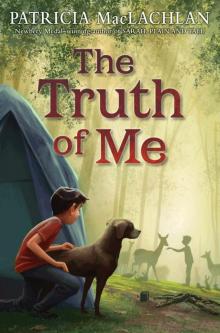 The Truth of Me
The Truth of Me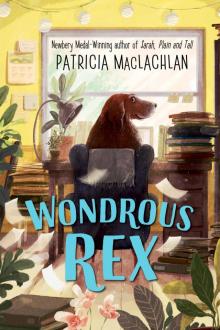 Wondrous Rex
Wondrous Rex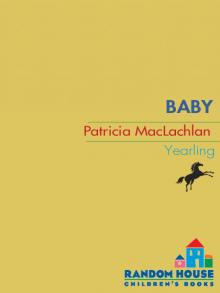 Baby
Baby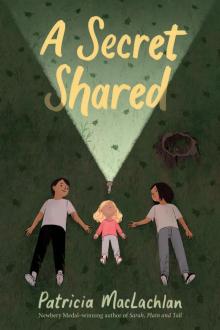 A Secret Shared
A Secret Shared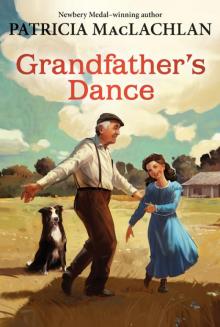 Grandfather's Dance
Grandfather's Dance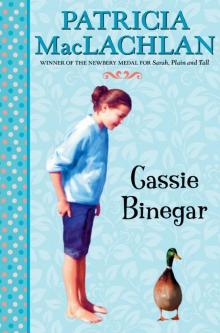 Cassie Binegar
Cassie Binegar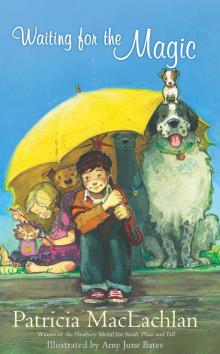 Waiting for the Magic
Waiting for the Magic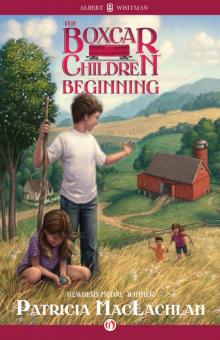 The Boxcar Children Beginning
The Boxcar Children Beginning My Father's Words
My Father's Words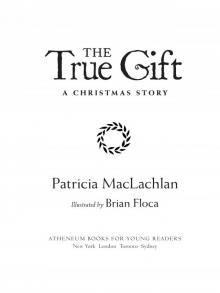 The True Gift
The True Gift